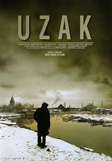
|
|
Credo:
believing in cinema (Simon Field’s choice)
Simon Field, Rotterdam FF (Nederlands), Jan 2004
Because of its grand Jury Prize
in Cannes and its consequent high profile, perhaps no film this year has
been able to speak to us so clearly of the continuing strength and value
of the personal voice in cinema. The film seems almost hand-carved, so
intimately is it crafted; Ceylan was director, scriptwriter, cinematographer
and his own producer. It confirms that visionary cinema can flourish under
such almost artisanal circumstances. It also proves, in case we had forgotten,
that a modest budget can produce as great a feat of cinema as overflowing
coffers. This meticulously directed and acted film, with its limited amount
of dialogue, also makes for intensely visual cinema. So much of its meaning
is conveyed by Ceylan’s masterly cinematography, by the quality of the
image and the movement of the camera as he uses these means to evoke the
world of two lonely and distant men.
UZAK stands here for so many films speaking with different voices from
different cultures and for the enormous value of diversity in the face
of all the forces of homogenisation that effect cinema as much as anything
in this age of globalisation.
******************
Nuri Bilge Ceylan’s UZAK also reminds us of the continuing strength of
the personal, independent voice in cinema. And the importance of such
voices speaking from different cultures cannot be overlooked as we consider
the vitality and future of cinema.
The meticulously organised loneliness of the divorced photographer Mahmut
is disrupted when his nephew Yusuf comes to stay with him. Mahmut is a
successful advertising photographer in Istanbul, the younger Yusuf comes
from the countryside to the city to look for work as a merchant seaman.
While Mahmut obviously has difficulty with the presence of his uninvited
guest, the well-intentioned yet socially handicapped Yusuf finds it equally
difficult to find his feet in the city. It is hard to get a job and making
contact with the cynical intellectual Mahmut is even harder. A short business
trip to the countryside doesn’t help bring the two closer together. The
lonely men live their lives almost without words. Mahmut’s life is set
almost entirely indoors, while Yusuf roams a snow-covered Istanbul that
is depicted by Ceylan with breathtaking beauty – picturesque and sharply
honed – in sound and pictures.
Ceylan – responsible for production, screenplay, camera and cutting, as
in his previous films KASABA en CLOUDS OF MAY – is a master in revealing
the characters of the two protagonists, their all-too-human frustrations
and dreams, in a way that will stay with us for a long time. Authors’
cinema at its most beautiful. Protagonist Toprak (Yusuf) was killed in
a car crash shortly after the first screening. Posthumously, he was given
the prize for the best actor in Cannes, together with Özdemir (Mahmut).
UZAK won the Grand Jury Prize there.
|

